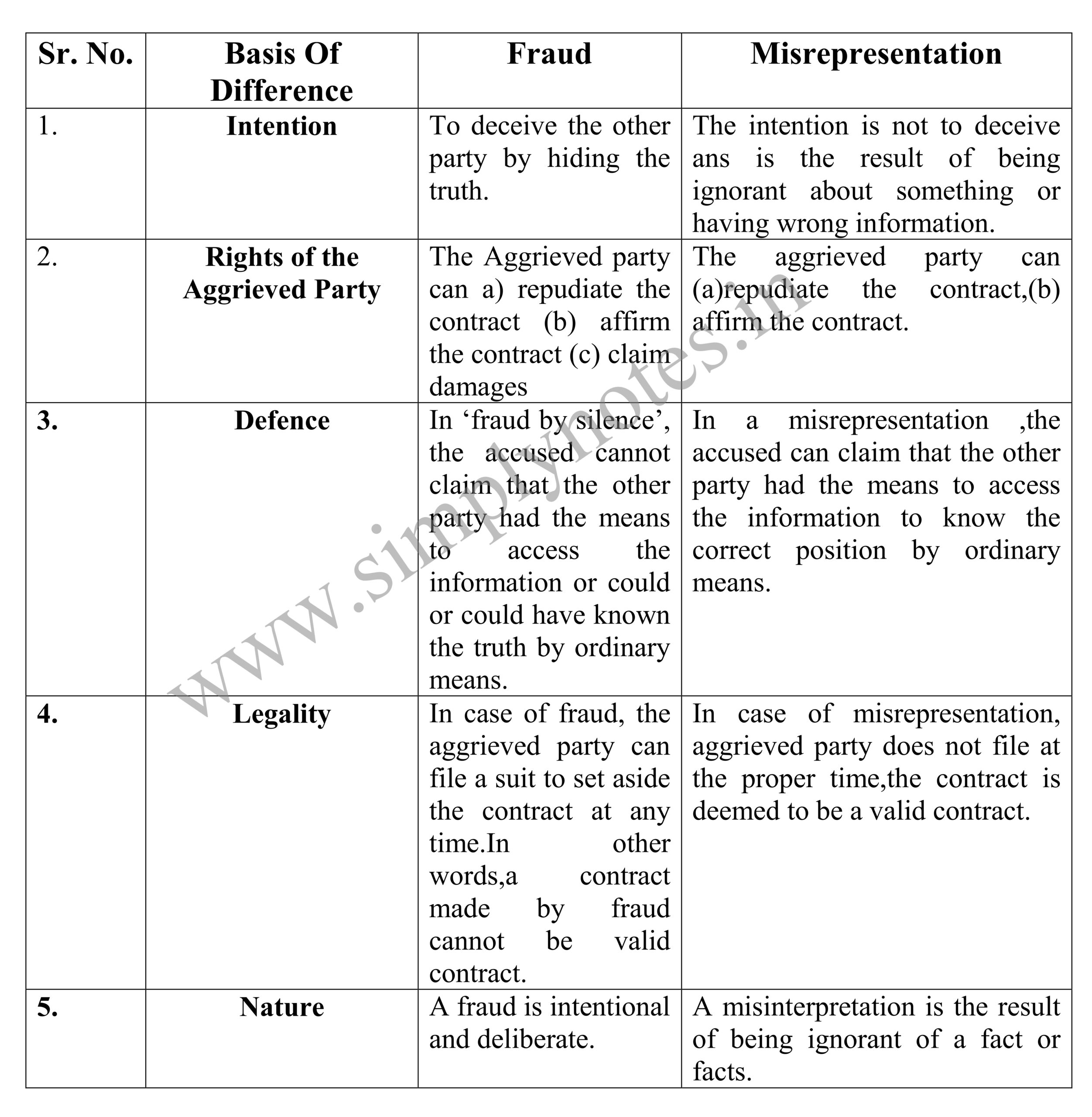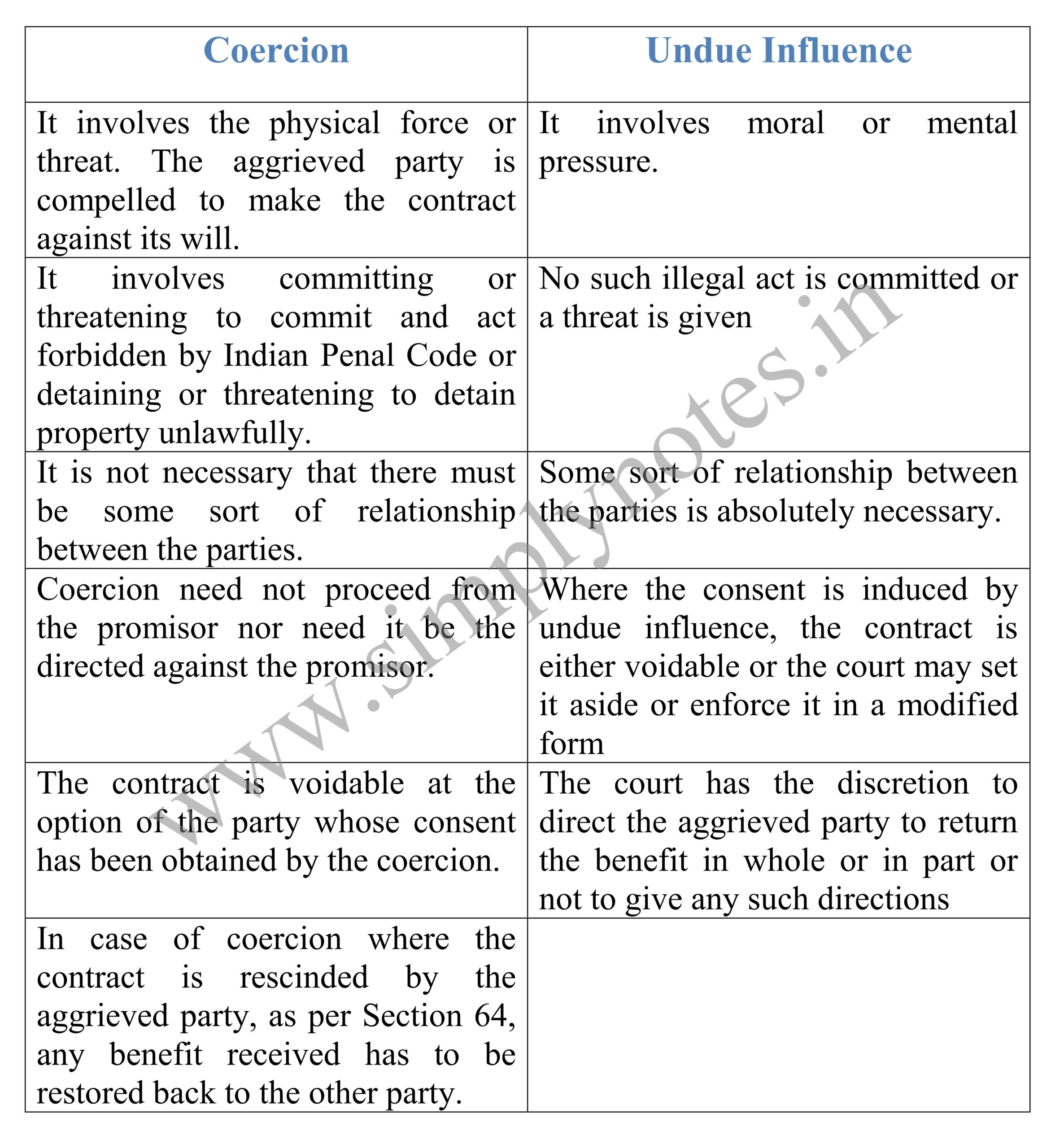Difference between Fraud and Misrepresentation
Difference between Coercion and Undue influence
Consideration
Section 2 (d) of the Indian Contract Act, 1872 defines consideration as ‘when at the desire of the promisor, the promisee or any other person has done or abstained from doing, or does or abstains from doing or promises to do or abstain from doing something, such an act or abstinence or promise is called consideration for the promise’.
From the above definition it can be inferred that,
1. Consideration must be at the desire of the promisor.
(2) Consideration may move from one person to any other person
(3) Consideration may be past, present or future and
(4) Consideration should be real though not adequate.
Type of Consideration
1. Past Consideration
It is also known as executed consideration. One party to contract has received the benefit before formation of contract.
2. Present Consideration
It is received at the time of formation of the contract. It is in process of execution.
3. Future Consideration
It will be received by a party after the formation of the contract. It is also called as executory consideration.
Legal Requirements Regarding Consideration
1. Consideration means doing or not doing something
The consideration is some act or abstinence. Some act means doing something while abstinence means not to do something. Thus, a consideration can be positive or negative. To do something is known as positive consideration while not to do something is known as negative consideration.
2. Consideration must move at the desire or Promisor
The consideration must move at the desire of the promisor. However, it is not necessary that it must for the benefit of the promisor. It can be for the benefit of a third person also.
3. Consideration can flow either from the promisee or any other person:
The consideration for a contract can move either from the promisee or from any other person. This point is made clear even by the definition of the word “consideration”, according to which at the desire of the promisor, the promisee or any other person, doing something is consideration.
4. Consideration may be inadequate
Consideration need not necessarily be of the same value as of the promise for which it is exchanged. But it must be something which can be inadequate as well. Inadequate consideration would not invalidate an agreement but such inadequate consideration could be taken into account by the court in deciding whether the consent of the promisor was freely given.
5. Consideration may be Past, Present or Future
The consideration may be past, present or future. A past consideration is valid in India while it is not regarded as valid in many other countries.
Past consideration:
When a consideration by a party for a present promise was given in the past i.e. before the date of the promise, it is said to be a past consideration.
Present Consideration:
A consideration to do or abstain from doing something given simultaneously with the promise is a present present consideration.
Future Consideration:
When the consideration from one party to the other is to pass subsequent to the act of doing or abstaining from doing something ,it is called a future consideration.
6. Act Promisor bound to do is not consideration
If the promisor is legally bound or required to perform something as a part of his duty, and he agrees to do so, it is not a valid consideration. The consideration must be something different from promisor’s existing obligation.
7. Consideration must be lawful
The consideration must be lawful. Lawful means as per the provisions of an act.An unlawful act or benefit received in an unlawful manner is not regarded as the consideration.
8. Consideration should be possible to perform
The consideration must be real and not illusory. It means the consideration should not be impossible to perform. An act does not recognize impossible performance. It may be physically impossible or can be legal impossible.




good the notes of law
i want economic note of b.com ofr 1 year of ccs university
thanku
Nice… notes of m law this is very easy to reading n very helpfully…
Thanks sir .very useful notes from exam point of view. Thank u very much .
thanks sir for the wonderful notes of m law..its very easy to learn
thank you very much
Thank u so mch for providing such a wonderful notes..thank u so mch ..
Very helpful and easy
Thank you very much